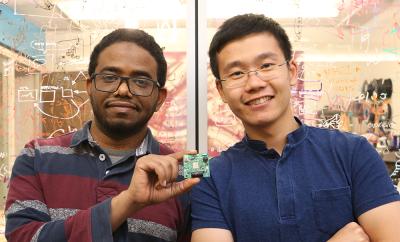Ph.D. Students Bedri and Zhang Finalists in Qualcomm Innovation Fellowship

Two Ph.D. students from the Human-Computer Interaction Institute are finalists in the 2017 Qualcomm Innovation Fellowship. They are one team out of 33 selected as finalists from a pool of 116 eligible applicants. Carnegie Mellon University's Yang Zhang and Abdelkareem Bedri will be preparing a 12-minute presentation that shares their idea, the differentiating factors, and the execution plan and strength of the team.
Qualcomm encouraged teams to submit their ideas related to electrical engineering and computer science in areas like user machine learning, internet of things, mobile and cloud security, and robotics. The ideas should engender Qualcomm's core values of innovation, execution and partnership. Bedri and Zhang submitted their project, "Towards General-Purpose Sensing with Synthetic Sensors," which was selected as one of the 33 final submissions.
According to Bedri and Zhang, studying smart environments by itself is nothing new.
"Smart sensing environments have long been studied and sought after," explained Zhang. "Today, such efforts fall under catch phrases like 'smart home' or the 'internet of things', but the goals have remained the same over decades – to apply sensing and computation to enhance the human experience."
The issue with traditional sensing is that it relies on individual sensors to measure a particular aspect of an environment. This is problematic because a single room can have dozens of complex environmental facets ("is the coffee brewed" to "is the tap dripping"), but also that the cost of so many physical sensors can be overwhelming both to purchase and to maintain.
To overcome these challenges, Bedri and Zhang sought to develop what they call a "super" sensor – a sensor that can blanket an entire environment. One super sensor could cover an entire room or more while collecting raw sensor data into actionable feeds without requiring domain knowledge from the user.
This is a key point, both Bedri and Zhang point out. By not requiring the user to be an expert or even a super-user of this domain area, general-purpose sensing is even closer to becoming more widely adopted by a larger group of users, which in the end, is a goal of technical HCI researchers in sensors and sensing.
Bedri and Zhang are headed to the QInF 2017 Finals at the Qualcomm headquarters in San Diego on April 5-6, 2017 where they will present their final project. The winners will receive a one year fellowship, fellowship funding, as well as a unique mentorship from Qualcomm's top engineers. Learn more about the Qualcomm Innovation Fellowship.
About the Students:
Yang Zhang is a second year Ph.D. student working with Chris Harrison. His research interest is combing machine learning and sensing technologies to make interfaces natural and efficient. His previous projects include sensing techniques for hand gesture recognition (i.e. Tomo) and On-body interactions (i.e. SkinTrack). General-purpose sensing intersects with sensing and machine learning, and sensing those facets could power many interactions, which will make computers more natural and efficient. All of these resonate with Yang’s research interests.
Abdelkareem Bedri is a first year Ph.D. student, working with Mayank Goel. His research is in ubiquitous computing and sensing, activity recognition, and gesture interaction. His previous work include silent speech recognition to (i.e. TMI) and eating event recognition in unconstrained environments (i.e. OEI). General purpose sensing act as a strong platform to recognize a wide range of activities with minimal instrumentation to the environment.

